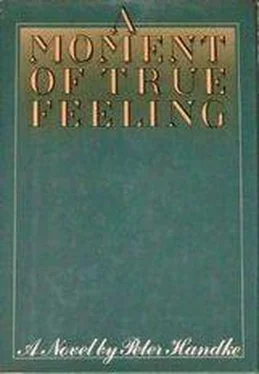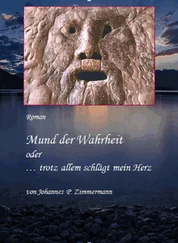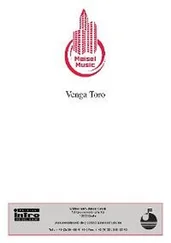In the child’s room he felt as though he were taking leave of something; not only of the child, but of the kind of life that had been right for him up until then. Now no kind of life was right for him. He stood there amid the scattered toys, and suddenly in his helplessness one of his knees gave way. He crouched down. I have to busy myself with something, he thought, already exhausted by the short time spent without imagination, and busied himself putting the laces, which the child had taken out of her shoes the night before, back in again. As Agnes slept, he could see nothing of her face; her hair had tumbled over it. He put his hand on her back to see how she was breathing. She was breathing so peacefully and smelled so warm that he remembered certain of the old days when everything seemed to be gathered under a wide dome and to belong together, when for instance he had involuntarily said “Agnes” to his wife and involuntarily said “Stefanie” to Agnes. Now that was gone; he couldn’t even remember it any longer. When Keuschnig stood up, he had the feeling that his brain was gradually cooling. He pulled down the skin of his forehead and closed his eyes firmly, as though that might warm his insensible brain. From today on, he thought, I shall be leading a double life. No, no life at all: neither my usual life nor a new one, for I shall only be pretending to live my usual life, and my new life will consist solely in pretending to live as usual. I no longer feel in place here, but I can’t conceive of being in place anywhere else; I can’t conceive of continuing to live as I’ve lived up until now, but no more can I conceive of living as someone else lived or lives. The thought of living like a Buddhist monk, a pioneer, a philanthropist, a desperado, doesn’t repel me, I merely find it unthinkable. I can’t live like anybody; at the most I can go on living “like myself.”—Suddenly, at this thought, Keuschnig was unable to breathe. In the next moment he felt as though he were bursting out of his skin and a lump of flesh and sinew lay wet and heavy on the carpet. As if he had soiled the child’s room merely by his thought, he hurried out.
Look neither to the left nor to the right, he thought as he went down the hallway. “Eyes front!” he said aloud. He looked at the red sofa in the one living room; a child’s book lay open on it: blatant disorder. Nothing was alien to him, everything repelled him. He closed the book and put it on the table in such a way that its edges lay parallel to the edges of the table. Then he picked up a thread from the carpet and carried it the whole length of the hallway to the trash basket in the kitchen. While doing all this, he made a frantic effort to think in complete sentences.
With a stupid look on his face, he stepped out of the dark apartment into the street. How mercilessly bright it was outside! I might just as well be naked, he thought, but a moment later looked down to make sure he had pulled up the zipper on his trousers, and at the same time fiddled with it discreetly. He mustn’t show that anything was wrong. Come to think of it, had he brushed his teeth? In the gutter on the other side of the boulevard, the water sparkled as it flowed down to the Porte d‘Auteuil. For a few minutes that took the stupid look off his face. The cobblestones under the water were bleached white. As he walked, Keuschnig suddenly saw a sunken lane not far from his native village. There were thin, wet-black blueberry roots along the side walls, where as a child he had often dug clay for marbles or projectiles. Lucky that rhyme cropped up when I was talking to Stefanie, he thought; otherwise, I’d already have given myself away. He pulled his cuffs out from under the sleeves of his jacket and for the first time that day became slightly curious. Keuschnig had always been curious, though he disliked involving himself in things. What would be the end of all this? Ordinarily he took the Métro at the PORTE D’AUTEUIL, changed at LA MOTTE-PICQUET-GRENELLE and got out at LATOUR-MAUBOURG, not far from the Place des Invalides in the 7th arrondissement, on the rue Fabert side of which the three-story mansion housing the Austrian embassy was situated. But that day he wanted to walk a bit. He would allow himself this little detour — maybe, in the course of it, something would turn up. He decided to take the Pont Mirabeau across the Seine and follow the Quais to the Invalides. On the way perhaps he would think up a system by which to deal with the neither/ nor in his head. That’s it, he thought, a system! and in passing looked at himself in the mirror outside a bakery on the rue d’Auteuil. Nothing unusual in his appearance. For a moment he tensed with curiosity.
On the rue Mirabeau, Keuschnig, who as a press attaché had learned to pick such words as Autriche or autrichien out of any newspaper at a glance, as though they were his own name, saw, out of the corner of his eye, a plaque with the word autrichien on it affixed to the wall of a house. It had been put there in memory of an Austrian who had joined a French Resistance group to fight the National Socialists, and had been shot down by the Germans on this spot some thirty years before. The plaque had been cleaned in preparation for the fourteenth of July, the French national holiday, and a tin can with a sprig of evergreen in it had been placed under it. The asshole, thought Keuschnig, and kicked the tin box, but stopped it when it kept on rolling. He crossed the Avenue de Versailles and saw on a hoarding a poster advertising a meeting: “Hortensia Allende will speak to us …” TO us! he thought, turned away and spat. Rabble! Passing a newspaper stand, where the only morning paper on display was the five o’clock edition of Le Figaro, he read that the Turkish invaders of Cyprus had entered Nikosia, the capital, and that war was imminent. How annoying, thought Keuschnig; what intolerable interference in my life! A couple, arm in arm, were coming toward him on the bridge. The woman was biting chunks off a long loaf of bread, as though such a war were quite out of the question, and that reassured him. But why was the man so tall? Disgusting to be so tall. And to think of him squirting his ridiculous sperm into the pathetic belly of this boring woman! He stopped walking in the middle of the bridge and looked down at the Seine. “Sous le pont Mirabeau coule la Seine et nos amours. ” A poster advertised the high-rise apartments on the opposite bank with the words: “Seen from the Pont Mirabeau, Paris is a poem.” Poetry gone sour! The river was brown as usual and flowed as usual toward the western hills, where the morning light moved the suburb of Meudon closer. To Keuschnig everything was equally far away and equally unreal: the sand pile on the left bank, the hills of Meudon and Saint-Cloud, the tips of his shoes. It was as though his glance, before it could take anything in, had been blunted by an invisible barrier; it could reach nothing, and he felt no desire to reach anything. He saw no friendly sight, saw only as a whipped man might have seen, and thought: I’d better go right down into the Métro, where a blank look attracts no attention. He took the train at JAVEL, and shortly after seven, unchanged except that the absence of prospects had put him in a bad humor, stepped into the Austrian embassy.
Keuschnig had an office on the second floor of the embassy building, with a chestnut tree outside his window. His work consisted chiefly of reading French newspapers and periodicals, marking articles or news items that related to Austria, when possible providing the ambassador with a daily digest, and twice a month sending the Foreign Ministry in Vienna a report on the image of Austria reflected in the French mass media. In drawing up these reports, he was expected to follow new guidelines, which specified that the images of Austria presented in the French press were in every case to be measured against an ideal image elaborated at the Ministry. Above all, Austria must be seen as something more than the land of Lippizaners and skiers. Whenever the traditional image made its appearance in the press or on television, Keuschnig was obliged to write letters of protest and rectification. He had pasted a model of such a letter over his desk. Last year, it pointed out among other things, the Financial Times had awarded Austria an Economic Oscar as the industrial country with the most favorable economic statistics. Keuschnig seldom received answers to these letters, and even more rarely to his reports to the Foreign Ministry. Occasionally he attended “working luncheons” at which French political figures met with the press, and for which he had to pay in advance. From time to time he received journalists at home, and itemized his expenses, for such receptions were regarded as part of his job. “Seated entertainment” meant dinner; “standing entertainment” consisted only of drinks or, in a pinch, of cold buffet. This, more or less, was his work, and thus far he had done it so seriously as to give no one else reason to smile. He himself had no image of his native land, and was glad there were guidelines to follow. He was seldom at a loss for an answer, except when letters came from children wishing to know something about Austria. But most of the questions in these letters had been dictated by grownups anyway.
Читать дальше












